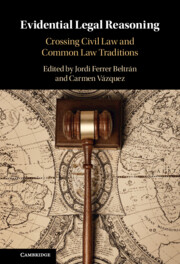Book contents
- Evidential Legal Reasoning
- Evidential Legal Reasoning
- Copyright page
- Contents
- Figures
- Tables
- Contributors
- Introduction
- Part I Evidence As an Area of Knowledge
- Part II Convergences between Systems
- 3 The Transformation of Chinese Evidence Theories and System
- 4 Truth Finding and the Mirage of Inquisitorial Process
- 5 Evidential Remedies for Procedural Rights Violations
- 6 Common Law Evidence and the Common Law of Human Rights
- Part III On Evidential Inferences
- Part IV Expert Evidence
- Part V Standards of Evidence As Decision-Making Rules
- Index
- References
6 - Common Law Evidence and the Common Law of Human Rights
Towards a Harmonic Convergence?
from Part II - Convergences between Systems
Published online by Cambridge University Press: 05 May 2022
- Evidential Legal Reasoning
- Evidential Legal Reasoning
- Copyright page
- Contents
- Figures
- Tables
- Contributors
- Introduction
- Part I Evidence As an Area of Knowledge
- Part II Convergences between Systems
- 3 The Transformation of Chinese Evidence Theories and System
- 4 Truth Finding and the Mirage of Inquisitorial Process
- 5 Evidential Remedies for Procedural Rights Violations
- 6 Common Law Evidence and the Common Law of Human Rights
- Part III On Evidential Inferences
- Part IV Expert Evidence
- Part V Standards of Evidence As Decision-Making Rules
- Index
- References
Summary
This paper considers the impact which European human rights law has made upon the common law rules of evidence with reference to the approach the European Court of Human Rights (ECtHR) has adopted towards exclusionary rules. Particular attention will be given to rules that have been developed by the ECtHR in relation to the right to counsel during police questioning (the so-called ‘Salduz’ doctrine) and the right to examine witnesses (the so-called ‘sole or decisive’ evidence rule). It will be argued that the most recent decisions in these respects appear to dilute some of the impact that these rules appeared to have made to the common law and diminish the effectiveness of the Court as a setter of evidentiary standards for domestic jurisdictions.
- Type
- Chapter
- Information
- Evidential Legal ReasoningCrossing Civil Law and Common Law Traditions, pp. 98 - 122Publisher: Cambridge University PressPrint publication year: 2022

